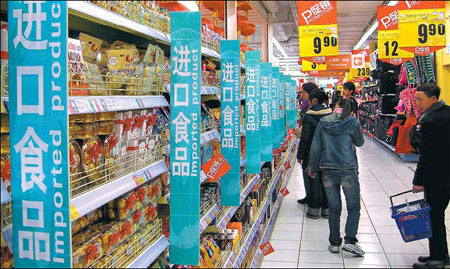
Customers select imported food in a supermarket in Ningbo, Zhejiang province, in this file photo. Many foreigners living in the country are feeling the pinch of rising food prices and the US dollar weakening against the yuan. [China Daily]
Bread, pasta, tortillas, canned fish and meat, dairy products, imported vegetables and fruits. These are staples of foreigners living in China. And that's precisely why spiraling food prices across the globe and the rise of the yuan against the US dollar have spelt double trouble for them.
Prices of wheat and corn have doubled over the past year or so, according to the US-based Earth Policy Institute. This means higher prices of food products made directly from them, such as bread, pasta and tortillas. Pork, beef, milk and eggs, which depend indirectly on the grains, have become costlier, too.
More than the rising food prices, it is the decline of the greenback that has made expatriates' life more difficult, says a 29-year-old Canadian living in Shanghai.
"The exchange rate of the dollar against the yuan has dropped more than 20 percent from when I came to China," he says. He was posted to the Shanghai office by his international export firm three years ago. "The devaluation of the dollar can be interpreted as a drop in my pay because I have to pay in yuan here."
Then take the example of a young French woman who lives in Beijing and shops almost daily at Jenny Lou's, a well-known chain store that imports a variety of food products. Peisha, as she prefers to be called, says prices of all imported food products she normally buys, such as canned tuna, bread, pasta, vegetables and fruits, have gone up. Her preferred loaf of bread alone costs an extra 2 to 3 yuan. Desperate to save as much as possible, she has started buying tuna canned in China because they cost less.
But it is not only consumers who are feeling the pinch of the rising food prices. People running restaurants that specialize in foreign cuisine have been hit hard too. "Everything has become costlier," says Lu Hongwei, owner of Agrilandia-Italian Farm. The 9-year-old restaurant in the northeast suburb of Beijing is popular among expatriates and white-collar workers for its rustic Italian countryside flavor.
"The price of pasta imported from Italy has risen thrice since last September. It's 70 percent more expensive than last year," says Lu, who also owns another Italian restaurant, Il Casale, near Lido Hotel. Pasta prices in Italy rose more than 20 percent last fall, triggering a nationwide protest in the country.
The cost of raw material has gone up by 40 percent in Lu's restaurants, forcing her to raise prices on her dishes by 15 percent. "I had to pass the pressure on (to customers)," Lu says. "Even then I earn less than what I used to." But she still considers herself lucky because the flow of customers in her two restaurants has not ebbed.